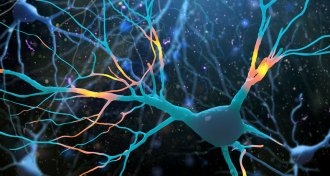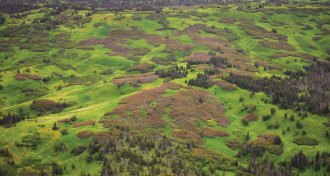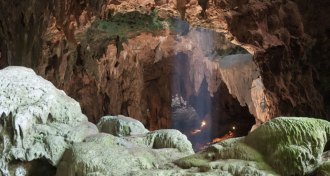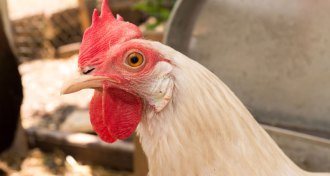All Stories
-
 Science & Society
Science & SocietyBlack hole image validates imagining the unimaginable
Human creativity conjured up the most extreme of astronomical phenomena long before they could be seen.
-
 Planetary Science
Planetary ScienceIsrael’s first moon mission lost moments before landing
The spacecraft’s engine cut out just before it was to touch down in the Sea of Serenity.
-
 Astronomy
AstronomyMeet one of the first scientists to see the historic black hole image
Kazunori Akiyama was one of the first scientists to see the black hole snapshot.
-
 Health & Medicine
Health & MedicineNASA’s Twins Study reveals effects of space on Scott Kelly’s health
Ten research groups studying the twin astronauts found long-term spaceflight can alter a person’s physiology and gene activity.
By Jeremy Rehm -
 Health & Medicine
Health & MedicineKetamine cultivates new nerve cell connections in mice
In mice, ketamine prods nerve cells to connect, which may explain the hallucinogenic drug’s ability to ease depression.
-
 Climate
ClimateClimate change made the Arctic greener. Now parts of it are turning brown.
Arctic browning could have far-reaching consequences for people and wildlife, affecting habitat and atmospheric carbon uptake as well as increasing wildfire risk.
By Hannah Hoag -
 Anthropology
AnthropologyA new hominid species has been found in a Philippine cave, fossils suggest
Cave fossils found in the Philippines come from a newly discovered member of the human lineage, researchers say.
By Bruce Bower -
 Astronomy
AstronomyHow scientists took the first picture of a black hole
Here’s how scientists connected eight observatories across the world to create one Earth-sized telescope in order to create an image of a black hole.
-
 Astronomy
AstronomyAll you need to know about the history of black holes
From dreaming up black holes to snapping the first picture of one, the history of black holes has had many twists.
-
 Astronomy
AstronomyThe first picture of a black hole opens a new era of astrophysics
Astronomers used a network of telescopes around the world to take a picture of the supermassive black hole in the galaxy M87.
By Lisa Grossman and Emily Conover -
 Health & Medicine
Health & MedicineChickens stand sentinel against mosquito-borne disease in Florida
To learn where mosquitoes are transmitting certain viruses, Florida officials deploy chickens and test them for antibodies to the pathogens.
-
 Climate
ClimateAntarctica’s iceberg graveyard could reveal the ice sheet’s future
Drilling deep into the seafloor beneath Antarctica’s “Iceberg Alley” could reveal new clues about how quickly the continent has melted in the past.